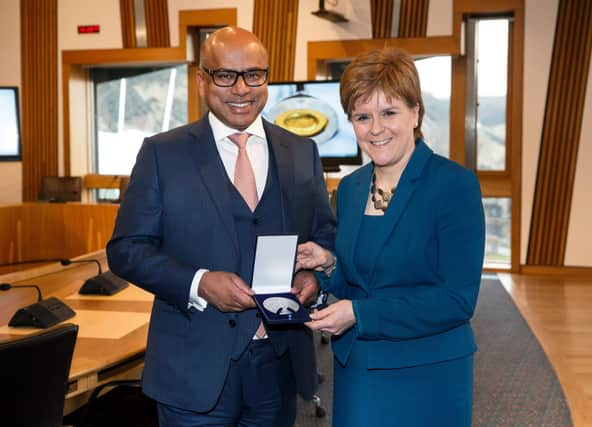Why things could be about to get worse for Nicola Sturgeon - Brian Monteith


It might be a different world to how most Scottish people see things or what they face every day, but believe me it is challenging – and it’s just about to get even more difficult.
As I anticipated in this column last week, Labour leader Anas Sarwar, being a Glasgow Southsider, has decided he will indeed stand against Sturgeon in her constituency of that name.
It is a strong statement of intent and I applaud him.
Advertisement
Hide AdAdvertisement
Hide AdIt matters not if he wins – although I would not be so foolish as to rule the possibility out – the election has not even started in earnest and he already deserves medals pinned to his chest because his decision means the SNP will have to redeploy its resources to protect the leader, so there is no unfortunate – and highly embarrassing – slip-up.
It means also that Sturgeon herself will have to spend more time in a constituency that she is so often criticised for neglecting, meaning she will not be free to roam Scotland encouraging others.
The requirement to defend her own patch is not the only worry. The SNP has been in power for nearly 14 years and a consensus is now fast developing that, like so many parties who remain in power for more than a decade, it is showing signs of hubris, arrogance and decay, which inevitably leads to mistakes.
The Hate Crime Bill, passed last week, will, I believe, prove to be a serious misjudgement that will eat into voter support. Already the polls are now trending away from the SNP and Sturgeon’s personal rating is falling.
Even when things go wrong or matters take a turn for the worse, the SNP refuses to accept the reality of how bad something is. Scotland might be suffering and in real pain, but blaming Westminster comes first.
We have the worst drug deaths in Europe, but Westminster will be blamed. Official Scottish Government reports tell us life expectancy is actually declining in 40 per cent of Scotland’s local authorities, but Westminster will be blamed.
Impartial statistics tell us Scottish homeless people are three times more likely to die than those in the rest of the UK, but Westminster will be blamed. Every measure of poverty in Scotland – such as child poverty – is worse in Scotland than England.
Yet no matter that in drugs, life expectancy, homelessness and poverty the economic and welfare policies are broadly the same on either side of the border. The difference is that on top of the basics, our devolved powers allow the Scottish Government to do things differently – but clearly worse.
Advertisement
Hide AdAdvertisement
Hide AdWestminster is not responsible for the SNP’s poor management of drug rehabilitation, public health initiatives, business support and housing policy – only Nicola Sturgeon is.
Scotland offers more benefits and subsidy – like free personal care introduced by Labour and the Liberal Democrats – and the money that goes to Scottish local authorities is determined in Holyrood – yet Scots face greater healthcare risks than others in the UK and average life expectancy is not lengthening like it is in England.
But it is in the economy that Scots have to especially worry – this is where the incompetence of the SNP really takes off and it is here the greatest threat to Nicola Sturgeon could arise.
We all know about failure of the BiFab yard and Prestwick Airport and Ferguson Marine and the windowless Ferries that have yet to sail.
The costs of those gambles by the SNP Government runs to more than £200 million – a large sum in anyone’s language. Now there is a new bigger scandal lurking – the underwriting of the Lochaber smelter, which could amount to a staggering £600 million charge to the Scottish taxpayer.
The financial issues are complicated and much has yet to unfold, but what we do know is that in 2016 Nicola Sturgeon’s Government loaned the Indian steel tycoon Sanjeev Gupta £7 million to buy the Clydebank and Dalzell steel plants. That loan has never been repaid, with the Scottish taxpayer still being on the hook.
Another of the Gupta Group’s purchases in 2016 was the aluminium smelter in Lochaber along with its adjacent power plant. To enable this deal to occur, the SNP Government provided a 25-year guarantee of 80 per cent of the value of a power supply contract between the smelter and the power plant worth around £575m.
Given the aluminium smelter employs around 100 people, that is a guarantee worth over £5m per job. In 2019 Margaret Hodge MP, former Labour head of the UK’s Public Accounts Committee, suggested the large financial risk that taxpayers were forced to take to safeguard such a small number of jobs was “bonkers”.
Advertisement
Hide AdAdvertisement
Hide AdCritically the SNP failed to extract any guarantees from Mr Gupta that he would actually build the factory. Instead Gupta used the Scottish Government guarantee to sell hundreds of millions of pounds of bonds, via the now bankrupt finance firm Greensill, to Swiss fund manager GAM.
Were Gupta’s firm to default and the Scottish Government guarantee be called in, the losses would come out of the UK Government-funded Scottish capital budget – used primarily to build hospitals and schools in Scotland.
Events are moving fast and the financials could implode within days – just as the election campaigns kick off. The First Minister may think matters cannot get worse. Mr Gupta might be about to disprove that theory.
- Brian Monteith is editor of ThinkScotland.org and served in the Scottish and European Parliaments for the Conservative and Brexit Parties respectively.
Comments
Want to join the conversation? Please or to comment on this article.